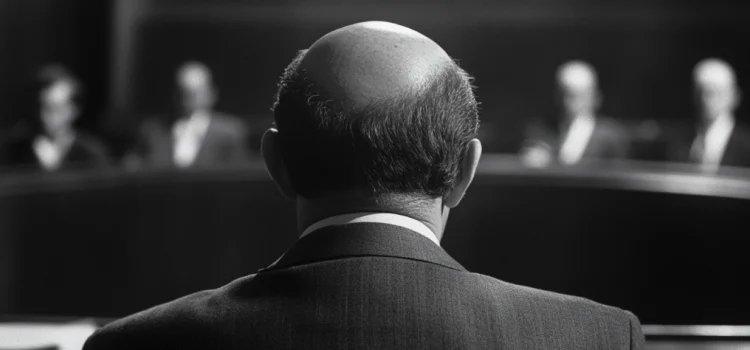

This article is an excerpt from the Shortform book guide to "Eichmann in Jerusalem" by Hannah Arendt. Shortform has the world's best summaries and analyses of books you should be reading.
Like this article? Sign up for a free trial here.
What exactly was Adolf Eichmann on trial for? What was the outcome, and was justice served?
In her book Eichmann in Jerusalem, Hannah Arendt discusses Adolf Eichmann’s trial. She shares her reasons for thinking that the trial—although it delivered the correct verdict—was in many respects illegitimate. She also offers an assessment of Eichmann’s final words.
Continue reading to learn about Adolf Eichmann’s trial, verdict, and execution.
The Illegitimacy of Adolf Eichmann’s Trial
Although Arendt spares no sympathy for Eichmann, whom she believes was blatantly guilty of the charges against him, she clarifies that the trial against him was deeply flawed. According to Arendt, Adolf Eichmann’s trial was primarily an attempt to educate the world about Jewish suffering in the Holocaust, rather than a dispassionate attempt to determine Eichmann’s guilt or innocence.
First, she points out that this view of the trial shouldn’t be controversial, since Israel’s then-Prime Minister David Ben-Gurion openly expressed his hopes for the trial—namely, to underscore how the Jewish suffering in the Holocaust fit into a larger narrative of Jewish oppression throughout history, and to show the ruthlessness of Israel’s enemies. Consequently, the prosecution in Eichmann’s trial called over 100 Jewish Holocaust survivors to the stand to recount their experiences, even though their testimonies didn’t specifically shed light on Eichmann’s guilt or innocence.
(Shortform note: Ben-Gurion also famously said with respect to the trial that “Eichmann’s personal fate is unimportant.” In other words, he maintained that shedding light on the Nazis’ systematic extermination of the Jewish people was the only thing that mattered about the trial. So, Eichmann’s sentence wasn’t secondary to Ben-Gurion—by his own admission, it didn’t matter at all.)
Arendt maintains that although Eichmann was indeed guilty, the trial nonetheless fell short of the standards of justice. She contends that because this trial was largely for show, it heavily favored the prosecution from the beginning. To illustrate, she points to several handicaps imposed on the defense. For instance, the defense wasn’t allowed to call witnesses to the stand or to cross-examine many of the prosecution’s witnesses. Moreover, the court didn’t supply the defense with any researchers to pore over the endless documents cited by the prosecution, meaning the defense couldn’t adequately prepare for the trial.
(Shortform note: Much like Arendt contends that Eichmann’s trial was tilted toward the prosecution, Kai Bird and Martin Sherwin argue in American Prometheus that the same was true of J. Robert Oppenheimer’s trial. Oppenheimer, the scientist responsible for developing the atomic bomb in World War II, underwent a hearing in 1954 to determine whether he could keep his security clearance. According to Bird and Sherwin, the hearing systemically favored the prosecution; Oppenheimer’s lawyers were denied access to the evidence cited by the prosecution, and the jury was biased by reading Oppenheimer’s case file before the trial began.)
The Verdict and Execution
Arendt reports that in December 1961—eight months after the trial began—the judges passed down the verdict: Eichmann was guilty of crimes against the Jewish people. Specifically, he was found guilty on four counts:
- Causing the deaths of millions of Jews
- Placing Jews in inhospitable conditions on the trains
- Causing bodily harm to millions of Jews
- Banning pregnancies and coercing abortions among Jewish women in one of the Jewish ghettos
(Shortform note: In the Israeli court’s conviction of Eichmann, it also had to justify its right to charge Eichmann—a German citizen—in the first place. Accordingly, the judges argued that Eichmann’s crimes against the Jewish people afforded the Israeli court jurisdiction over his hearing, since Israel (formally founded in 1948) was the official state of the Jewish people.)
Arendt explains that, in finding Eichmann guilty, the judges argued that he didn’t satisfy either of the legal exemptions listed in the Nazis and Nazi Collaborators Law of 1950. First, he wouldn’t have been legally responsible for his actions if he had acted under pain of immediate death (when someone takes action to avoid being killed). But this condition wasn’t satisfied: Members of killing squads could leave their posts or request a transfer without much penalty, and the Nuremberg trials of Nazi leaders found no cases where someone was killed for leaving the SS.
(Shortform note: Similar to this legal exemption in the Nazis and Nazi Collaborators Law, US criminal law says that defendants are generally not responsible for crimes committed under duress—that is, under the threat of serious harm or death. However, the duress defense has limits; for example, duress defenses in the case of homicide are often unsuccessful since many states are reluctant to provide exemptions for murder.)
Second, Eichmann would’ve been legally exempt from responsibility if he’d done his “best to reduce the gravity of the offense,” such as by intentionally creating an inefficient train system to hamper the Nazi’s genocidal efforts. However, Arendt points out that per Eichmann’s own admission, this wasn’t the case—on the contrary, Eichmann consistently bragged about working hard to fulfill his oath to the Nazis and obey orders from higher-ups.
(Shortform note: One such individual who attempted to hinder the Holocaust by reducing the gravity of his offenses was Kurt Gerstein, a major of the SS assigned to improve efficiency in the gas chambers. Gerstein, who joined the SS in hopes of sabotaging it from within, was assigned to transport Zyklon B—an especially deadly gas—to the gas chambers directly. Realizing its purpose, he instead disposed of the gas by convincing other officials that the chamber was leaking. For this reason, the Nazis had to use far less efficient gases in their chambers, meaning Gerstein minimized the number of Jews that the Nazis could murder.)
Following an unsuccessful appeal in May 1962, Eichmann was hanged days later. According to Arendt, his last words were striking for how bland and uninspired they were: “After a short while, gentlemen, we shall all meet again. Such is the fate of all men. Long live Germany, long live Argentina, long live Austria. I shall not forget them.” Arendt argues that these tepid last words reinforce what was obvious throughout the trial—Eichmann’s evil nature was startlingly unremarkable and mundane, highlighting the banality of evil.
(Shortform note: Eichmann’s execution was particularly significant given that it was the first, and only, civil execution in Israel’s history. And although the death penalty technically remains legal in Israel, experts note that it is vanishingly rare because Israel only allows it in cases of genocide, treason, war crimes, and crimes against humanity.)

———End of Preview———
Like what you just read? Read the rest of the world's best book summary and analysis of Hannah Arendt's "Eichmann in Jerusalem" at Shortform.
Here's what you'll find in our full Eichmann in Jerusalem summary:
- What “the banality of evil” means—and why the concept is controversial
- What drove the notorious Nazi official Adolf Eichmann to do what he did
- Why Hannah Arendt believed Eichmann was unremarkable






